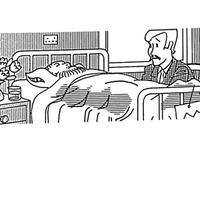Leciono 17. Akcidento
|Инцидент (1)
|accident
Lesson 1|Accident
Lektion 17. Unfall
Lesson 17. Accident
Lección 17. Accidente
Leçon 17. Accident
Les 17. Ongeluk
Lição 17. Acidente
Урок 17. Несчастный случай
Leciono 17.
Lesson 1
Akcidento
Accident (1)
An accident
P Saluton, Helena!
P(1)|Hello|Hello Helena
Ĉu vi bone fartas?
question particle|you|well|are you doing
Estas bien
괜찮으세요
Hej, kiel laca kaj pala vi aspektas!
||||pâle||
Hey|how|tired|and|pale|you|look
Hey, how tired and pale you look!
¡Oye, qué cansada y pálida estás!
야, 너 정말 피곤하고 창백해 보여!
Kial?
Why
Why?
¿Por qué?
Kio okazis?
|s'est passé
What|happened
what happened
¿Que pasó?
무슨 일이에요
Kie vi estis?
где||
Where|you|were
Where have you been?
¿Dónde has estado?
어디 있었어?
H Mi iris al la hospitalo por viziti mian avon.
|||||больницу||||бабушку
|||||||||grand-père
I|I|went|to|the|hospital|to|visit|my|grandfather
H I went to the hospital to visit my grandfather.
H Fui al hospital a visitar a mi abuelo.
H 할아버지를 만나러 병원에 갔어요.
Li akcidentiĝis.
|попал в аварию
|a eu un accident
He|had an accident
He got into an accident.
Tuvo un accidente.
그는 사고를 당했습니다.
Li falis hejme kaj rompis la kruron.
||||||колено
||||||jambe
He fell|fell|at home|and|broke|the|his leg
He fell at home and broke his leg.
Se cayó en su casa y se rompió la pierna.
그는 집에서 넘어져 다리가 부러졌습니다.
P Ho, la kompatinda!
|||совместимая
|||compatissante
P(1)|Oh|the|Oh, the poor!
P Oh, poor thing!
P ¡Ay, pobrecito!
Sed trankviliĝu, kara.
|успокойся|
|calme-toi|
but|calm down|dear
But calm down, dear.
하지만 진정하세요, 얘야.
Kiel li fartas nun?
how|he|is doing|now
How is he now?
그 사람은 지금 어떻게 지내요?
H Li estas en granda doloro.
|||||боль
|||||douleur
he|He|is|in|great|pain
H He is in great pain.
H 그는 큰 고통을 겪고 있습니다.
Li estas kovrita de ŝvito, kaj lia gorĝo brulas pro soifo.
||покрыт||пот поте|||горло|горит||жажда
||couvert||||||||
He|is|covered|with|sweat|and|his|throat|is burning|because of|thirst
He is covered in sweat, and his throat is burning with thirst.
그는 땀에 젖어 있고 목이 갈증으로 타오른다.
Kaj li povas manĝi absolute nenion.
||||абсолютно|
|||manger||
And|he|can|eat|absolutely|nothing at all
And he can eat absolutely nothing.
그리고 그는 아무것도 먹을 수 없습니다.
P Sed kiel okazis tia akcidento?
||||такой|
P(1)|but|how|did happen|such|accident
P But how did such an accident happen?
H Nu, li falis.
H(1) pronoun|Well|he|fell
H Well, he fell.
H 글쎄요, 넘어졌어요.
Kaj - kiel vi scias - li loĝas sola, do neniu aŭdis la bruon, kiam li falis.
||||||||никто|||шум|||
||||||||personne||||||
And|as you know|you|know|he|lives|alone|so|nobody|heard|the|noise|when|he|fell
And - as you know - he lives alone, so no one heard the noise when he fell.
그리고 - 아시다시피 - 그는 혼자 살기 때문에 그가 넘어졌을 때 아무도 그 소리를 듣지 못했습니다.
Pro tio li kuŝis sangokovrita sur la planko, ĝis li estis trovita de iu najbaro.
|||лежал|в крови|||на полу||||найден||каким-то|сосед
|||était couché|||||||||||
for|that|he|lay|covered in blood|on|the|floor|until|he|was|found|by|a neighbor|neighbor
Because of this he lay covered in blood on the floor until he was found by a neighbor.
이 때문에 그는 이웃에게 발견될 때까지 피투성이가 되어 바닥에 누워 있었습니다.
Tiam li febris jam pro la ŝoko de la akcidento kaj pro perdo de sango.
тогда||ли лихорадил||||шок||||||потере крови||крови
||était fiévreux||||||||||||
then|he|had a fever|already|due to|the|shock|of|the|accident|and|due to|loss|of|blood loss
By then he was already feverish from the shock of the accident and from loss of blood.
그러다가 그는 사고의 충격과 출혈로 인해 이미 열이났습니다.
P Sidiĝu, kara.
|Сидите|
|assis|
P(1) Sit|sit down|dear
P Sit down, dear.
P 앉으세요.
Ankaŭ vi estas iom ŝokita.
||||шокирована
||||choqué
also|you|are|a bit|shocked
You're a little shocked, too.
당신도 조금 충격을 받았어요.
H Vere, jes.
|Yes|yes
La flegistino diras, ke la kuracisto preskribis por li amason da drogoj.
|медсестра||||||||много||лекарств
|||||||||||médicaments
The|nurse|says|that|the|doctor|prescribed him|for him|him|a bunch of|a lot of|drugs
The nurse says the doctor prescribed a lot of drugs for him.
간호사는 의사가 그에게 여러 가지 약을 처방했다고 말했습니다.
Efektive, ŝajnas ke li estis injektita je tiom da drogoj, ke li apenaŭ rekonis min!
|||||введён||||||||узнал|
|||||||autant|||||||
Indeed|it seems|that|he|was|injected|with|that much|of|drugs|that|he|barely|recognized|me
Indeed, it seems he was injected with so many drugs that he barely recognized me!
사실 그 사람은 저를 거의 알아볼 수 없을 정도로 많은 약을 주사한 것 같아요!
(Ploras)
плачет (1)
pleure
Crying
(Cries)
P Trankviliĝu, kara.
P(1)|calm down|dear
P Calm down, dear.
H Lia voĉo estas mallaŭta kiel flustro, kaj li tusas terure.
||||тихая||шёпот|||кашляет ужасно|ужасно
|||||||||tousse|
H(1)|His|voice|is|quiet|like a|whisper|and|he|coughs|terribly
H His voice is low as a whisper, and he coughs terribly.
H 목소리는 속삭이듯 낮고, 기침도 심하다.
P Kompatinda avo.
P(1) Compatible grandparent|Compatible grandparent|grandfather
P Poor grandfather.
P 불쌍한 할아버지.
Kia afero!
What a|thing
What a thing!
무슨 일이야!
Sed diru al mi, ĉu li estas ankoraŭ en danĝero?
|||||||||danger
but|tell|to|me|whether|he|is|still|in|danger
But tell me, is he still in danger?
하지만 말해 보세요. 그는 여전히 위험에 처해 있나요?
Kion diris la kuracisto?
what|said|the|doctor
What did the doctor say?
H La granda danĝero pasis, dank' al Dio.
|||опасность||благодаря||
|||||merci||
H(1)|The|great|danger|has passed|thanks|to|God
The great danger has passed, thanks to God.
H 큰 위험이 지나갔습니다. 하느님 감사합니다.
Laŭ la kuracisto, mia avo havas bonan ŝancon plene resaniĝi.
||врачу|||||шанс|полностью|выздороветь полностью
|||||||||se rétablir
according to|according to|the doctor|my|grandfather|has|good|chance|fully|recover fully
According to the doctor, my grandfather has a good chance of fully recovering.
의사에 따르면, 나의 할아버지는 완전히 회복될 가능성이 높다고 합니다.
P Do vidu, la krizo estas solvita.
||||кризис||решена
||voir||||
P(1)|do|see|the|crisis|is|solved
P So see, the crisis is resolved.
P 그럼, 위기는 해결됐네요.
Post sep tagoj en la hospitalo, ĉio estos en ordo.
||||||всё будет|||
After|after|days|in|the|the hospital|everything|will be|in order|order
After seven days in the hospital, everything will be okay.
병원에 입원한 지 7일이 지나면 모든 것이 괜찮아질 것입니다.
H Sed eble la kuracisto parolis tiel nur por trankviligi min.
|||||||||успокоить|
|||||||||tranquilliser|
H(1)|but|perhaps|the|doctor|spoke like that|that way|only|to|calm down|me
H But maybe the doctor spoke like that just to reassure me.
H 그런데 의사가 나를 진정시키려고 그런 말을 한 건 아닐까.
Eble li mensogis.
||врал
||a menti
maybe|he|lied
Maybe he lied.
어쩌면 그는 거짓말을 하고 있었을지도 모릅니다.
P Ne, ne, kara.
P(1)|not|not|dear
Certe via avo baldaŭ resaniĝos.
||||выздоровеет
||||se remettra
certainly|your|grandfather|soon|will recover
Aŭskultu, morgaŭ mi venos kun vi al la hospitalo por viziti lin denove.
|demain|||||||||||
Listen|tomorrow|I|will come|with|you|to|the|hospital|to|visit|him|again
들어보세요, 내일 제가 그를 다시 만나기 위해 당신과 함께 병원에 갈 것입니다.
H Dankon, kara.
H(1)|Thank you|dear

